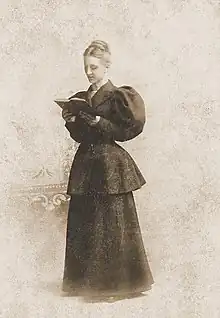Caroline Ruutz-Rees
Caroline Ruutz-Rees (August 16, 1865 – February 15, 1954) was a British–American academic, educator, and suffragist. Ruutz-Rees was very involved in the women's suffrage movement in Connecticut. She served as the first head teacher of Rosemary Hall. She was also a member of the executive board of the Connecticut Woman Suffrage Association (CWSA).

Biography
Ruutz-Rees was born in London on August 16, 1865.[1][2] She attended private schools in London.[3] Ruutz-Rees came to the United States around 1882 or 1883, eventually becoming a naturalized citizen.[4][5][3] The next year, she started teaching at the St. John the Baptist School in New York and later, at the St. Mary's School in Burlington, New Jersey.[1] In the years of 1898 and 1899, she studied advanced Greek courses at Yale's graduate school.[3]
In 1890, she started working as headmistress of Rosemary Hall, in Wallingford.[1] The curriculum of Rosemary Hall was strong in the humanities, with Ruutz-Rees working "to empower young women to pursue a wide variety of intellectual studies."[6] The school, under her direction, was one of the first American girls' schools to require Uniforms.[7] Ruutz-Rees' method of teaching and administrating the school was based on English girls' schools.[8] In 1900, the school was moved to Greenwich.[9] She went to Scotland to study at St. Andrew's University, earning her degree in 1904.[3] She studied French literature in Grenoble and in Paris.[3] Ruutz-Rees earned her master's degree in 1909 and her doctorate in 1910 from Columbia University.[10][3] She wrote articles about French Literature for the Modern Language Association and wrote for Modern Language Notes, Romantic Review and the Yale Review.[3] In 1910, she published a book about Charles de Sainte-Marthe, Charles de Sainte-Marthe: A Study in French Renaissance.[3]
Ruutz-Rees was very involved in the women's suffrage movement in Connecticut.[5] She was part of the executive board of the Connecticut Woman Suffrage Association (CWSA), served as vice president of the American Woman Suffrage Association, and was a founding member of the Greenwich Equal Franchise League.[5] Ruutz-Rees also founded the National Junior Suffrage Corps around 1914.[5][11] Ruutz-Rees participated in a large women's suffrage parade in Hartford in 1919.[12] The suffragists presented a 27,000 signature petition in support of the women's vote to the Connecticut state legislature.[12] During World War I, Ruutz-Rees served as the chair of the Woman's Committee of Connecticut's Council of Defense.[13] She held the chair for more than a year, and resigned due to her other commitments.[14] She was also a supporter of the Woman's Land Army.[15] At Rosemary Hall, Ruutz-Rees had students plant and care for community war gardens.[15]
Ruutz-Rees continued to participate in civic life after women won the vote. In 1920, she was appointed to the executive committee of the Democratic National Committee.[16] In 1922, she was considered a possible Democratic candidate for the U.S. Senate.[17]
Ruutz-Rees turned over the full-time administration of the school to Eugenia Baker Jessup in 1938 and continued to work with the school after her retirement.[8][9][18] During her life, she adopted two children.[2] Ruutz-Rees died in her home in Greenwich on February 15, 1954.[1]
References
- "Miss Ruutz-Reese, Rosemary Hall Founder, Dies". Record-Journal. February 16, 1954. p. 11. Retrieved December 31, 2022 – via Newspapers.com.
- Slaga-Metivier, Susan J. "Biographical Sketch of Caroline Ruutz-Rees". Biographical Database of NAWSA Suffragists, 1890–1920 – via Alexander Street.
- The Biographical Cyclopaedia of American Women. Halvord Publishing Company, Incorporated. 1924. pp. 180–181.
- Armes, Ethel (February 15, 1914). "Women of Great Prominence Will Make Visit to Birmingham in March". The Birmingham News. p. 40. Retrieved December 31, 2022 – via Newspapers.com.
- "Suffragists in Greenwich". Greenwich Historical Society. Retrieved January 7, 2023.
- Lee, Tony (March 29, 2019). "From Greenwich to Wallingford: RememberIng Life at Rosemary Hall". The Choate News. Retrieved December 31, 2022.
- "Asolando – Caroline Ruutz Rees". Book Lives. Retrieved December 31, 2022.
- "75-Year-Old Londoner Honored by Her Girls of Rosemary Hall". Newsweek. 16 (19): 48. November 1940 – via Internet Archive.
- "Rosemary's Girls". Newsweek. 35 (20): 80–81. May 1950 – via Internet Archive.
- Baughman, Roland (May 1956). "Our Growing Collections". Columbia Library Columns. 5 (3): 32 – via Internet Archive.
- NAWSA (1914). The Hand Book of the National American Woman Suffrage Association and Proceedings of the Forty-Sixth Annual Convention Held at Nashville, Tennessee (PDF). New York: N. W. S. Publishing Co., Inc. pp. 43–44.
- Lemay, Kate (Fall 2019). "Caroline and Her Convictions". Choate Rosemary Hall Bulletin – via Issuu.
- "Contributors to this Number of the Yale Review". The Yale Review. 7 (4): x. July 1918 – via Internet Archive.
- "Miss Ruutz-Rees Resigns as Chairman of Women's Division". Hartford Courant. July 11, 1918. p. 2. Retrieved January 7, 2023 – via Newspapers.com.
- Johnson, Kathleen Eagen (Winter 2015). "Greenwich Women Face the Great War". Connecticut Explored. Retrieved January 7, 2023.
- "Women Share Honors With Men on Executive Committee of Democratic National Committee". The Palm Beach Post. March 31, 1920. p. 3. Retrieved January 7, 2023 – via Newspapers.com.
- "Miss Ruutz-Rees May Be Candidate for U.S. Senate". The Bridgeport Telegram. July 15, 1922. p. 1. Retrieved January 7, 2023 – via Newspapers.com.
- "Miss Caroline Ruutz-Rees, Founder of Rosemary Hall in Greenwich". Newsday (Nassau Edition). February 16, 1954. p. 67. Retrieved December 31, 2022 – via Newspapers.com.